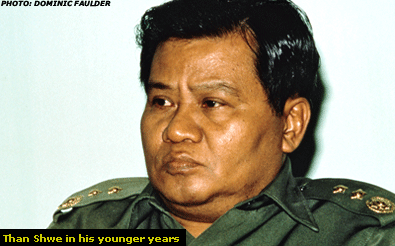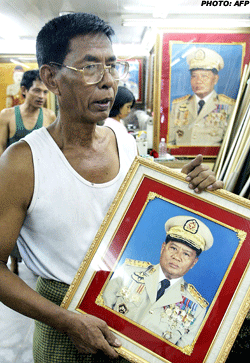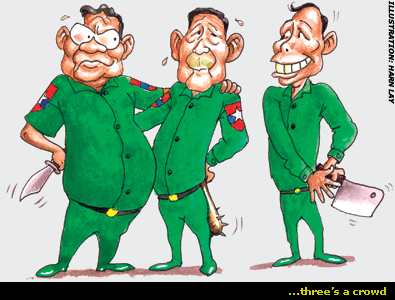
| By AUNG ZAW | FEBRUARY, 2005 - VOLUME 13 NO.2 |
Burma’s paramount leader may be an unknown figure to most, but he has shown his leadership mettle
The Burmese hardly know their paramount leader, Snr-Gen Than Shwe. His former close friends knew him as an honest and simple soldier. But even if he lacks charisma and possesses few rounded leadership skills today, he has an iron grip on power.

Lately there has been a proliferation of tales and rumors about him and his family, though reliable sources have trouble verifying them. The reclusive Than Shwe rarely meets journalists, and the government releases only snippets of news about his and his family’s activities.
Rumor has it that Than Shwe acts like a king, and his daughters order military officers to treat them like royalty. Some insiders say he wants to be remembered as a benevolent king. The 72-year-old general is known to bear a grudge against the regime’s main opponent Aung San Suu Kyi, who has been under house arrest on and off since 1989. Just the mention of her name is said to send him into tantrums.
Domestically, Than Shwe is said to like watching Chinese Shaolin martial art movies, and his favorite grandsons are treated like contenders. He occasionally plays golf, a pastime favored by military brass, including his late predecessor Ne Win.
But there are some hard facts breaking through the wall of silence around
 |
|
CHURNING OUT THAN SHWE’S PORTRAITS: Cult in the making? |
He was a member of Ne Win’s ruling Burma Socialist Program Party, or BSPP, where he became a central executive committee member in 1988. Analysts note his political thinking today is still very much in the style of the old BSPP. For instance he set up a BSPP-style Union Solidarity Development Association, of which he became chairman. He also convened a National Convention in 1993, ostensibly to draft a constitution. But the convention has yet to achieve anything.
During the long BSPP era, Than Shwe was known as a faithful anti-reformist. But while the party only nominally embraced socialism, he is known to be a strong believer in the ideology.
In 1985, Than Shwe became deputy commander-in-chief of the army and deputy defense minister. Three years later he became deputy chairman of the ruling State Law and Order Restoration Council, or SLORC, which replaced the BSPP. Then in 1992 he became chairman of the new ruling State Peace and Development Council, or SPDC.
There is no record of his ever traveling to a western country. Now, he would not be allowed to go even if he wanted to. Than Shwe and other high ranking officials in the regime face visa bans imposed by western countries.
After his appointment as leader, Than Shwe held a series of secret cabinet meetings. They were known as nya kyaung, or night school, because they took place at night. Than Shwe, of course, was “headmaster.” At these meetings, the general reportedly made careful and calculated policy decisions about the course of the country and the armed forces. Some generals who attend the nya kyaung now hold senior jobs with the junta. For instance, Lt-Gen Thein Sein, now SPDC’s Secretary One, and Lt-Gen Khin Maung Than, a senior SPDC member and a leading official in the Defense Ministry, were among those who regularly showed up at Than Shwe’s night school in the early 1990s.
He is married to an ethnic Pa-O, Daw Kyaing Kyaing. Many friends who knew them in the 1980s recall that Than Shwe’s family were unusually modest at the time. Like many other superstitious generals— particularly Ne Win—and their families, Than Shwe and his wife are known to seek advice from astrologers and monks. Unlike Ne Win’s family, Than Shwe’s sons and daughters have not been actively involved in big business.
However, Than Shwe’s son, Kyaing San Shwe, and his wife are known to dabble in business. They run the Classic International Company, involved in construction and making iron grills. The son is also thought to be involved in the illegal gambling business.
The Than Shwe family is also well connected with a young Burmese tycoon, Te Za (sometimes written Teza). The businessman, 40, is President and Managing Director of Htoo Trading Company, a major player in
Since 1993, he has also been involved in the arms industry. His Myanmar Avia Export is the country’s sole representative of
Than Shwe’s eldest daughter is also the talk of the town as Te Za’s apparent girlfriend. And Te Za is supposed to have arranged
 |
|
Than Shwe and his wife Daw Kyaing Kyaing pose in front of a Buddhist shrine near Patna, during a visit to India in October 2004 |
Although one of Than Shwe’s main reasons for removing Khin Nyunt was his alleged corruption, he has turned a blind eye to close allies considered unusually wealthy. Three such friends, Lt-Gen Maung Bo, Lt-Gen Ye Myint and Industry Minister Aung Thaung are, according to western diplomats, notoriously corrupt, and unusually wealthy despite their relatively modest army salaries. But Than Shwe has ignored the reports, perhaps considering personal loyalty more important.
Than Shwe was also agriculture minister under SLORC, and this is where he developed a fascination for building dams. In Kyaukse, his birthplace, he has built schools, hospitals, factories, a university and an international airport.
The general is untutored in international affairs, and his understanding of diplomacy has been questionable. But so far he has managed to keep good relations with neighboring countries. He officially sticks to a “neutral” foreign policy, but under his rule
Than Shwe also plays the
For trade and strategic reasons, the two giants have an interest in keeping
A few days after he sacked prime minister and military intelligence chief Gen Khin Nyunt last October, Than Shwe went to
Analysts noted
Than Shwe’s last visit to
As a member of the Association of Southeast Asian Nations, or Asean, Than Shwe is likely to try to maintain friendly relations with neighboring
Yet analysts believe
Apart from its economic and political sanctions against the regime, the
Observers feel the new label will make Than Shwe a bit anxious—not that he will lose any sleep over it. He should be aware that
While the country is in a state of political and economic despair, Than Shwe has been quietly consolidating personal power, despite earlier reports that he was ill and about to retire. All things considered, the former postal clerk has done quite well. He is not regarded as cold-blooded, but he has taken calculated risks to pre-empt trouble—and if he perceives any threat from within the Tatmadaw, or armed forces, he has shown he can be ruthless.
He deals with any hint of trouble in the Tatmadaw in much the same way as Ne Win before him. Ne Win would remove anyone he believed to be disobedient, disloyal or becoming popular enough to be a potential rival. Than Shwe has followed exactly the same path. In this, he has exercised a famous Burmese saying: kyu-bin-koke-kyu-ngok-ma-kyan-zeya. That means if you remove reeds you should take out everything, not even leaving stumps that could sprout again. Thus when Khin Nyunt was purged, many of his associates went with him, and even those with links to the general face an uncertain fate.
Under Than Shwe, the Tatmadaw is no longer accountable to the people and the nation. The armed forces are not protecting or serving the people, but simply propping up a group of warlords while clinging to power themselves. Burmese society is still feudal, with no rules for succession.
Than Shwe may have overstayed his welcome at the top. But there are no signs he is about to give up his throne.
Even high-ranking officers are not sure where they stand By Aung Zaw Last month, rumors in Some observers think the gun battle story was sparked by the death “on duty” of Lt-Col Bo Win Tun, 42, Dep Snr-Gen Maung Aye’s personal assistant. Many believe he was killed in the cowboy-style shoot out. There was no official explanation of how he died. The rumor mills were further fed by the mysterious public disappearance for weeks of newly appointed Prime Minister Lt-Gen Soe Win. It prompted Thai Prime Minister Thaksin Shinawatra to say that political tension in As anticipated, all top brass subsequently appeared in public in an obvious show of unity. But many remained unconvinced that all was well. Since the removal of former military intelligence chief and prime minister Gen Khin Nyunt in October last year, the regime’s stability and unity have been continually questioned. Military watchers say the effects of the purge are still being felt in High ranking officials in Khin Nyunt’s now-disbanded military intelligence network have also been put on trial behind prison walls in “There is a tremendous amount of uncertainty,” said one veteran journalist based in the capital. He lamented: “Even high ranking officers are not sure where they stand at the moment— if they are found to be linked to Khin Nyunt, they will be fired and face trial.” Some local observers said the generals may have disagreed about the National Convention on drawing up a new constitution, which reconvened in late February, and how to deal with ethnic minority groups. Some army leaders wanted powerful Wa and other ethnic groups to be disarmed. The generals may be quarreling, but this time the main struggle is believed to be between Army Commander Dep Snr-Gen Maung Aye and his junta boss Snr-Gen Than Shwe. Maung Aye was supposed to take over the helm from Than Shwe several years ago. But he remains deputy chairman of the ruling State Peace and Development Council, or SPDC. Oddly enough, Maung Aye was only recently given the newly-created rank of deputy senior general, suggesting that Than Shwe was not ready to leave. Than Shwe is also thought to be grooming Gen Thura Shwe Mann to head the armed forces. Military watchers say Shwe Mann, who is known to be an assertive number three in the ruling junta, is being groomed to take over from Than Shwe. The junta leader still holds the most powerful military position of Commander-in-Chief of the Armed Forces. But it is unclear whether Maung Aye or Shwe Mann will be given this top position. Observers say Maung Aye is the “John Wayne of Many observers are also doubtful that Maung Aye, 65, will be given the number one position. Since 2000, there has been strong speculation within SPDC circles that if Than Shwe retired he will bring down Maung Aye with him. Maung Aye, who was from Maung Aye (some former friends says he is half-Chinese) was believed to have been behind Khin Nyunt’s downfall. The two were at loggerheads for many years. But this does not necessarily mean Maung Aye’s star is rising. If Than Shwe thinks Maung Aye is becoming a threat to his throne, he won’t be spared. But it could be premature to regard Maung Aye as a threat. Military observers say Than Shwe does not brook any hint of a threat, and would use a charge of high treason against his rivals. Than Shwe didn’t even tolerate his own former boss, Ne Win, who spent his last days under house arrest. Ne Win’s grandsons are under detention charged with high treason, and his favorite daughter, Sandar Win, is still under house arrest. Some analysts say Maung Aye is smart enough to figure out what’s going on. One western businessman with a keen interest in
Uncertainty in 